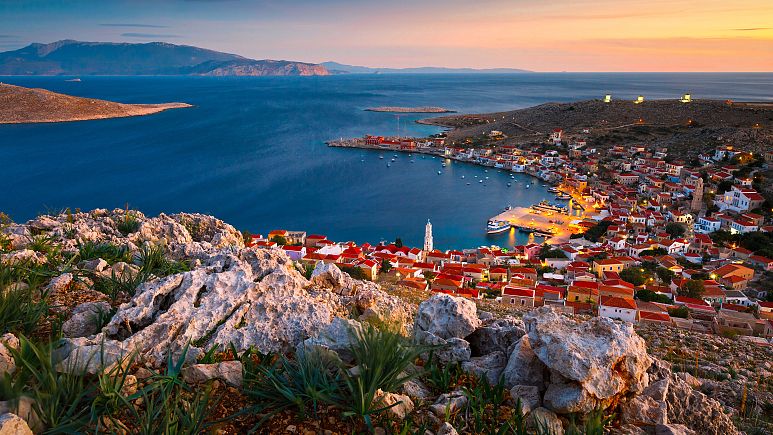

Meet the locals on the island of Tilos
Hidden gems like Tilos may not dominate your Instagram feed, but there’s far more to discover in Greece than Mykonos and Santorini. Not only is the picturesque island in the Dodecanese part of a vast ecological park and nature reserve, but it’s also entirely self-sufficient in energy. The Tilos Project saw the island welcome Greece’s first hybrid power station, which produces energy from its very own wind farm and solar power generators. Visitors to the charming 63 sq km isle usually arrive by ferry from Rhodes and are more likely to run into curious partridges, rare herbs and endangered eagles than people. With more than 400 varieties of flora and fauna and over 150 species of birds, the island’s 500 residents are cheerfully outnumbered by wildlife on what has been unofficially crowned Greece’s green island.
Take the road less travelled in Hydra
Just a 90-minute boat ride from the busy metropolis of Athens lies the island of Hydra. But, with its sleepy cobbled streets, whitewashed walls and total absence of cars, the bustling Greek capital feels a million miles away. Part of the Saronic Islands, Hydra hasn’t just slammed the brakes on motorised vehicles – it has never allowed them in the first place. Instead, locals rely on a herd of donkeys for transport up amphitheatre-like hills rising steeply from stone harbour walls. As a result, life moves at a slower pace, children play freely in the streets and noxious exhaust fumes are non-existent. Spend an afternoon getting lost among warren-like alleys to the tune of church bells and the occasional clatter of hooves for a step back in time with nothing but your legs to carry you.
Break new ground on Astypalaia
Astypalaia, also in the Dodecanese, is being billed as the first smart and sustainable Mediterranean island, with 1,000 electric vehicles replacing around 1,500 engines – and the green fleet is only the beginning. The revolutionary project aims to transform the island into a zero-impact zone using green energy, exclusively electric vehicles and state-of-the-art technology. Hop on an electric bus or take the wheel of an electric hire car to explore Astypalaia ‘s wonderful wilderness, taking in its pretty whitewashed villages, ancient Venetian castle, sleepy tavernas and kaleidoscope skies. Plans are also underway for a new hybrid RES station that will maximise the island’s renewable energy potential and help preserve its natural beauty for years to come.
Discover hidden gems in popular Paros
Paros may be one of the busier islands in the Cyclades but stray from the beaten path and you’ll be rewarded with an abundance of natural gems. Nestled in the northern part of the island lies Paros Park and 80 hectares of protected natural beauty. Lace up your hiking boots for several trails across the rocky peninsula or follow the signs to Faro Di Capo Korakas, a historic lighthouse perched on a towering 60m cliff. Herb-scented hills and labyrinth-esque villages aside, Paros is also celebrated for its sustainability focus, including a new initiative that aims to banish single-use plastic from its shores. Currently, Paros is on track to become the first waste-free island in the Mediterranean through its pioneering initiative, Clean Blue Paros with Common Seas, which supports over 100 local businesses that have committed to becoming completely plastic-free.
Become one with nature on Lipsi
Back in the Dodecanese lies the perfect sustainable travel experience for those looking to get off-grid. Perched amid rocky reefs and surrounded by deserted islands, Lipsi is the ideal destination for banishing background noise and embracing Mother Nature’s bounty. Recently the island became a no-sunbed zone, encouraging travellers to physically connect to the earth by stretching out on its smooth, natural rock, before cooling off in the wide, wild sea. When the sun falls, 28 self-sufficient solar lights now light up areas that previously lacked electricity coverage, with motion sensors that increase light level as people approach, and dim to 30 per cent to reduce energy consumption when no one is around.
Swim amongst the seagrass near Andros
Despite being the second largest island of the Cyclades, Andros is one of the least crowded and most diverse, with statuesque mountains cleaved by fertile valleys and crisscrossed with bubbling streams. A walker’s paradise, hikers can wander through ancient villages and scramble down rocky shores, where divers will find sprawling underwater meadows of swaying sea grass. The Posidonia Meadows are endemic to the Mediterranean and are vital for filtering the seawater, limiting coastal erosion and hosting marine life – all while absorbing 15 times more CO2 than a similar sized plot in the Amazon rainforest. Recent initiatives aim to raise awareness about the importance of seagrass to encourage responsible yacht anchoring in the region.
Source Euronews Travel

